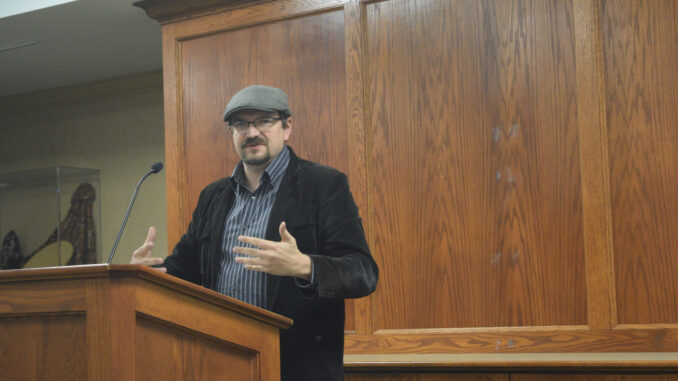
Zach Petroff | Opinions Editor
Nov. 17, 2022
We are all, at one point in our lives, a stranger.
Alfred Schutz defines the term stranger as one who tries to be permanently accepted, or at least tolerated by the group in which he approaches.
On Tuesday, Dr. Erik Garrett, an associate professor of communication and rhetorical studies at Duquesne, gave a lecture in the Africa Room as part of the inaugural Faculty Research Award from the Center for Migration, Displacement and Community Studies for his publication, “Strangeness of the Strange: Strangeness and Proximity in Schutz, Husserl and Levinas.”
The Center for Migration, Displacement and Community Studies provides a research award for graduates, undergraduates and faculty. All of that research is in the field of migration studies.
“Dr. Garrett’s research on the ‘stranger’ reminds us that we are living in a time of unprecedented human displacement, and his critical engagement with the concept of the stranger provides new insights into recent events,” said the Director of the Center for Migration, Displacement, and Community Studies, Jennie Schulze, in her introduction to Garrett.
“Perhaps most importantly, his research focuses us to reflect on how we understand and welcome the stranger in keeping with the spirit and mission of Duquesne University,” Schulze said.
Garrett, author of “Why Do We Go to the Zoo?: Communication, Animals, and the Cultural-Historical Experience of Zoos” and “El Barrio De la Colina: Dos Estudios de Fenomenologia Urbana,” spoke to an audience about “understanding the concept of the immigrant.”
“The phenomenological analysis linking proximity and specialty to the stranger triggers a radical ethical imperative, so that’s sort of my central thesis here at this project,” Garrett said.
Aided by PowerPoint, Garrett was able to provide a powerful and thought-provoking analysis to the global migration crisis. Stories of three-year-old Alan Kurdi’s lifeless body washed up on a Turkish beach, coupled with the drowning of Oscar Alberto Martínez Ramírez and his daughter Valeria in the Rio Grande, signify that these issues are both apparent across the globe and at home in the United States.
Weaving between past and current events, while examining immigration through a human lens, Garret’s lecture revolved around this philosophical approach of migrants as strangers.
“It was excellent to see somebody really apply philosophy in a way that is very approachable for the common audience and at the same time utilizing philosophy to really substantiate in a very fundamental way,” said Gabriela Sanchez, graduate assistant for the Center for Migration, Displacement and Community Studies. “I think he did a really great job of grounding that for the sake of migration studies and of philosophy, and making that link there. That needs to be done more often.”
Garrett examined both the acclaim and criticism of Schutz’s work but ultimately agreed with Schutz’s assessment that the refugee is a “special type of stranger.”
“So I asked the question, ‘So how can our neighbor be a stranger, or can we invite the immigrant to be our neighbor? What types of ethical responsibilities do we have to the stranger?” Garrett said.
Abbey McCann, who has taken several classes from Garrett, was in attendance for the lecture.
“His work is really fascinating for what we do in the department, but also what it means to be human in general,” McCann said. “ The award that he won is pretty great, and I think it speaks to a lot of what we do in human communication and why it’s important to run to the other and accept others.”
Kendal Nasiadka, the Migration Club’s president, was in attendance for the lecture and is aware of the impact this type of research can have on the student body at Duquesne.
“We have so many students here who are like those migrants that [Garrett] was talking about, or they’re second and third-generations, so they have these really tangible connection, but they don’t know how to effectively communicate them because they might not have the actual forum to, and they might not have the research experience like professors do,” Nasiadka said. “So having somebody else be in that same position, it kind of does uplift what the students are trying to do.”
For those interested in joining the Migration Club, email centerformigration@duq.edu or nasiadkak@duq.edu.

